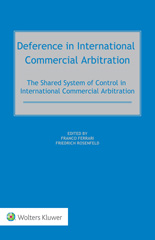Deference in International Commercial Arbitration : The Shared System of Control in International Commercial Arbitration
368 p.
In international arbitration, deference entails that one decision-maker does not make an autonomous assessment but limits its decision-making power out of respect for the decision or authority of another actor. For example, a court exercising post-award review might refrain from reviewing a question of procedure de novo but instead defer to a prior determination made by the arbitral tribunal. In this book, prominent arbitration practitioners and academics offer the first systematic analysis of such deference in international arbitration. With abundant reference to case law from major arbitration hubs, the analysis is organized around the three relationships in which questions of deference arise:public-private relationships in which a State actor (e.g., a court) must decide whether it should pay deference to determinations made by a private actor (e.g., a tribunal or an arbitral institution);public-public relationships in which a State actor (e.g., a court at the place of recognition and enforcement) must deci
de whether it should pay deference to another State actor (e.g., a court at the seat); andprivate-private relationships in which a private actor (e.g., an arbitral tribunal) must decide whether it should pay deference to another private actor (e.g., another arbitral tribunal or an arbitral institution).The book makes an important contribution to tracing the boundaries of the multiple layers of control over arbitration proceedings. It takes a giant step towards establishing the right equilibrium between the different layers of authority and thus meeting a pivotal challenge for the viability of arbitration as a form of dispute resolution. [Publisher's text].
Special access authorizations may apply; please contact us for further information.
-
Informationen
ISBN: 9789403503271
THEMENBEREICHE


